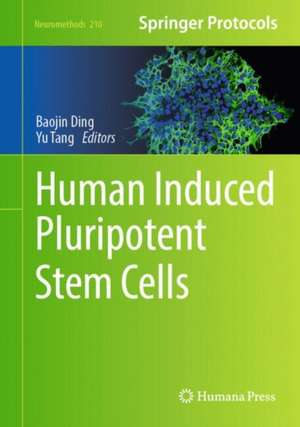Human Induced Pluripotent Stem Cells: Neuromethods, cartea 210
Editat de Baojin Ding, Yu Tangen Limba Engleză Hardback – 15 iul 2024
Cutting-edge and comprehensive, Human Induced Pluripotent Stem Cells is a valuable resource for researchers and students in neuroscience, neurology, stem cell biology, and other related fields.
Din seria Neuromethods
- 5%
 Preț: 347.57 lei
Preț: 347.57 lei - 15%
 Preț: 659.53 lei
Preț: 659.53 lei - 15%
 Preț: 665.08 lei
Preț: 665.08 lei - 18%
 Preț: 986.63 lei
Preț: 986.63 lei - 24%
 Preț: 852.89 lei
Preț: 852.89 lei - 18%
 Preț: 953.03 lei
Preț: 953.03 lei - 18%
 Preț: 955.25 lei
Preț: 955.25 lei - 20%
 Preț: 1129.36 lei
Preț: 1129.36 lei - 20%
 Preț: 1252.04 lei
Preț: 1252.04 lei - 18%
 Preț: 1291.45 lei
Preț: 1291.45 lei - 15%
 Preț: 652.31 lei
Preț: 652.31 lei - 18%
 Preț: 955.70 lei
Preț: 955.70 lei - 23%
 Preț: 705.39 lei
Preț: 705.39 lei - 18%
 Preț: 973.38 lei
Preț: 973.38 lei - 18%
 Preț: 964.86 lei
Preț: 964.86 lei - 18%
 Preț: 968.03 lei
Preț: 968.03 lei - 15%
 Preț: 662.95 lei
Preț: 662.95 lei - 15%
 Preț: 646.43 lei
Preț: 646.43 lei - 15%
 Preț: 649.71 lei
Preț: 649.71 lei -
 Preț: 395.29 lei
Preț: 395.29 lei - 19%
 Preț: 580.67 lei
Preț: 580.67 lei - 19%
 Preț: 584.12 lei
Preț: 584.12 lei - 19%
 Preț: 566.41 lei
Preț: 566.41 lei - 15%
 Preț: 652.17 lei
Preț: 652.17 lei - 15%
 Preț: 655.13 lei
Preț: 655.13 lei - 18%
 Preț: 959.36 lei
Preț: 959.36 lei - 15%
 Preț: 652.49 lei
Preț: 652.49 lei - 15%
 Preț: 649.54 lei
Preț: 649.54 lei - 15%
 Preț: 649.87 lei
Preț: 649.87 lei - 15%
 Preț: 650.19 lei
Preț: 650.19 lei - 15%
 Preț: 648.42 lei
Preț: 648.42 lei - 18%
 Preț: 1039.22 lei
Preț: 1039.22 lei - 18%
 Preț: 963.15 lei
Preț: 963.15 lei
Preț: 1389.30 lei
Preț vechi: 1694.27 lei
-18% Nou
Puncte Express: 2084
Preț estimativ în valută:
265.85€ • 278.26$ • 221.27£
265.85€ • 278.26$ • 221.27£
Carte tipărită la comandă
Livrare economică 31 martie-14 aprilie
Preluare comenzi: 021 569.72.76
Specificații
ISBN-13: 9781071639986
ISBN-10: 1071639986
Pagini: 250
Ilustrații: XIII, 252 p. 57 illus., 50 illus. in color.
Dimensiuni: 178 x 254 mm
Greutate: 0.68 kg
Ediția:2024
Editura: Springer Us
Colecția Humana
Seria Neuromethods
Locul publicării:New York, NY, United States
ISBN-10: 1071639986
Pagini: 250
Ilustrații: XIII, 252 p. 57 illus., 50 illus. in color.
Dimensiuni: 178 x 254 mm
Greutate: 0.68 kg
Ediția:2024
Editura: Springer Us
Colecția Humana
Seria Neuromethods
Locul publicării:New York, NY, United States
Cuprins
Generation and Characterization of Human Induced Pluripotent Stem Cells via Retroviral Delivery of Yamanaka Factors.- Generation of Human Induced Pluripotent Stem Cells via Episomal Vectors.- Generation and Characterization of Human Induced Pluripotent Stem Cells from Urine-Derived Cells.- Gene Editing and Reprogramming of Human Fibroblast Cells to Human Induced Pluripotent Stem Cells.- Validation of Pluripotency of Human Induced Pluripotent Stem Cells.- Generation of Knockout Human PSCs using CRISPR/Cas9 Editing with a Donor Template.- Generation of Reporter Human Pluripotent Stem Cells using CRISPR/Cas9 Editing.- Deletion of Large Intergenic Chromosomal Fragments in Human Induced Pluripotent Stem Cells (hiPSC) by CRISPR/Cas9 Genome Editing.- Gene Editing in Human Induced Pluripotent Stem Cell Using Prime Editing.- Lentiviral Delivery of Transcription Factors to Generate Motor Neurons from Human Induced Pluripotent Stem Cells.- Generation of Motor Neurons from Human Induced Pluripotent Stem Cells using Small Chemical Molecules.- Differentiation of Human Induced Pluripotent Stem Cells (hiPSCs) into Mature and Contractible Skeletal Muscles.- Generation of Functional Microglia from Human Pluripotent Stem Cells.- Assembling an Indirect Coculture System for Preparation of Highly Pure hiPSC-Derived Motor Neurons at Late-Stage Maturation Stages.- Measuring Protein Nuclear Transport via a Dual Reporter in iPSC-Derived Neurons.- Nuclear mRNA Export Measurement using FISH in iPSC-Derived Neurons.- Integrated Approach for the Differentiation of Neurons and Astrocytes from Human Pluripotent Stem Cells.- Generation of Human iPSC-Derived Cerebellar Organoids.- Cortical-Organoid Grafted Microvascular Bed on a Chip.
Textul de pe ultima copertă
This volume explores the latest developments in the field and showcases the vast potential of human induced pluripotent stem cells (hiPSCs) in advancing neuroscience research. The chapters in this book are organized into three parts. Part One describes the generation, characterization, and validation of hiPSCs using different methodologies from various resources. Part Two focuses on techniques for genome editing of hiPSCs. Part Three covers various hiPSC applications in neuroscience research and strategies for analyzing hiPSC-based model systems. These applications include the generation of neural subtypes, glial cells, and skeletal muscles; assembling co-culture systems to prepare highly pure neurons at late maturation stages; measuring nuclear transport of proteins and transcripts in cultured neurons; and generating brain organoids. In the Neuromethods series style, chapters include the kind of detail and key advice from specialists needed to achieve successful results in your laboratory.
Cutting-edge and comprehensive, Human Induced Pluripotent Stem Cells is a valuable resource for researchers and students in neuroscience, neurology, stem cell biology, and other related fields.
Cutting-edge and comprehensive, Human Induced Pluripotent Stem Cells is a valuable resource for researchers and students in neuroscience, neurology, stem cell biology, and other related fields.
Caracteristici
Includes cutting-edge methods and protocols Provides step-by-step detail essential for reproducible results Contains key notes and implementation advice from the experts
